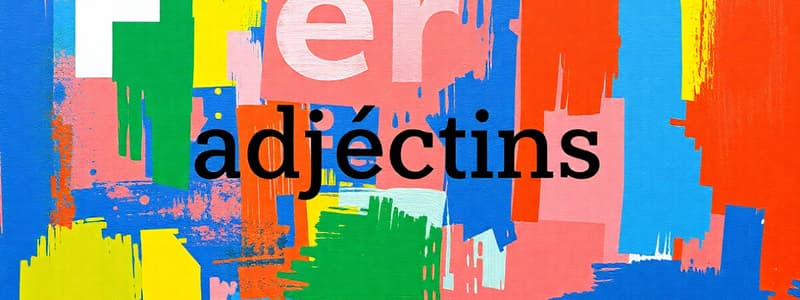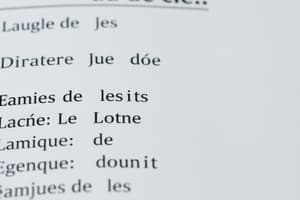Podcast
Questions and Answers
The adjective 'beau' changes to 'bel' when it precedes a noun that begins with a __________.
The adjective 'beau' changes to 'bel' when it precedes a noun that begins with a __________.
vowel sound
In French, the adjective "grand" always follows the noun it describes.
In French, the adjective "grand" always follows the noun it describes.
False (B)
Which of the following adjectives changes to "vieil" before a noun starting with a vowel or silent 'h'?
Which of the following adjectives changes to "vieil" before a noun starting with a vowel or silent 'h'?
- vieux (correct)
- beau
- nouveau
- même
Provide the feminine form of the adjective "nouveau" when it precedes a noun.
Provide the feminine form of the adjective "nouveau" when it precedes a noun.
The adjective "ancien" means "former" when it precedes a noun and "ancient" when it follows a noun.
The adjective "ancien" means "former" when it precedes a noun and "ancient" when it follows a noun.
Match the adjective to its correct form when preceding a masculine singular noun starting with a vowel or silent 'h':
Match the adjective to its correct form when preceding a masculine singular noun starting with a vowel or silent 'h':
What change typically occurs to the indefinite article 'des' when a plural adjective precedes a noun in formal French?
What change typically occurs to the indefinite article 'des' when a plural adjective precedes a noun in formal French?
Which of these adjectives DOES NOT typically precede the noun it modifies in French?
Which of these adjectives DOES NOT typically precede the noun it modifies in French?
Complete the sentence: C'est une __________ maison. (It's a beautiful house.)
Complete the sentence: C'est une __________ maison. (It's a beautiful house.)
In colloquial French, the change of 'des' to 'de/d'' before a plural adjective and noun is strictly enforced.
In colloquial French, the change of 'des' to 'de/d'' before a plural adjective and noun is strictly enforced.
Which sentence demonstrates an adjective changing meaning based on its position?
Which sentence demonstrates an adjective changing meaning based on its position?
Give an example of a French phrase where 'des' is retained before a plural adjective and noun in colloquial speech.
Give an example of a French phrase where 'des' is retained before a plural adjective and noun in colloquial speech.
The adjective 'même' always follows the noun it modifies in French.
The adjective 'même' always follows the noun it modifies in French.
In the phrase "d'autres amis", the article 'des' changes to 'd'' because __________ precedes the noun.
In the phrase "d'autres amis", the article 'des' changes to 'd'' because __________ precedes the noun.
Which of the following pairs shows the correct change of article when the adjective precedes the noun?
Which of the following pairs shows the correct change of article when the adjective precedes the noun?
What is the meaning of un ancien professeur?
What is the meaning of un ancien professeur?
The adjectives nouveau, beau, and vieux only have irregular forms when modifying feminine nouns.
The adjectives nouveau, beau, and vieux only have irregular forms when modifying feminine nouns.
When 'cher' precedes a noun, as in 'une chère amie', it means __________.
When 'cher' precedes a noun, as in 'une chère amie', it means __________.
In what situation would you use the transformation nouveau -> nouvel?
In what situation would you use the transformation nouveau -> nouvel?
Explain the difference in meaning between 'le dernier exercice' and 'l’année dernière'.
Explain the difference in meaning between 'le dernier exercice' and 'l’année dernière'.
Flashcards
autre
autre
Other
joli(e)
joli(e)
Pretty
beau/belle
beau/belle
Beautiful, handsome
mauvais(e)
mauvais(e)
Signup and view all the flashcards
bon(ne)
bon(ne)
Signup and view all the flashcards
même
même
Signup and view all the flashcards
grand(e)
grand(e)
Signup and view all the flashcards
nouveau/nouvelle
nouveau/nouvelle
Signup and view all the flashcards
gros(se)
gros(se)
Signup and view all the flashcards
petit(e)
petit(e)
Signup and view all the flashcards
jeune
jeune
Signup and view all the flashcards
vieux/vieille
vieux/vieille
Signup and view all the flashcards
bel
bel
Signup and view all the flashcards
nouvel
nouvel
Signup and view all the flashcards
vieil
vieil
Signup and view all the flashcards
What happens to 'des'?
What happens to 'des'?
Signup and view all the flashcards
ancien meaning
ancien meaning
Signup and view all the flashcards
dernier meaning
dernier meaning
Signup and view all the flashcards
pauvre meaning
pauvre meaning
Signup and view all the flashcards
cher meaning
cher meaning
Signup and view all the flashcards
Study Notes
Adjectives That Precede the Noun
- Adjectives like autre, joli(e), beau/belle, mauvais(e), bon(ne), même, grand(e), nouveau/nouvelle, gros(se), petit(e), jeune, and vieux/vieille commonly come before the noun in French.
Irregular Adjective Forms
- Beau, nouveau, and vieux have special masculine singular forms used before a vowel sound or silent 'h'.
- Beau becomes bel before a vowel sound.
- Nouveau changes to nouvel before a vowel sound.
- Vieux transforms into vieil before a vowel sound.
Examples of Usage
- C’est une belle maison translates to "It’s a pretty house."
- C’est un vieil homme means "He’s an old man."
- C’est le nouveau professeur means "That’s the new teacher."
Plural Article Transformation
- When a plural adjective precedes a noun, the indefinite article des usually changes to de/d’.
- De grandes autos means "big cars."
- De nouvelles idées means "new ideas."
- D’autres amis means "other friends."
Colloquial Usage Note
- In colloquial French, des is often retained before the plural adjective + noun.
Meaning Shifts with Position
- The meaning of some adjectives changes depending on whether they come before or after the noun.
- Un ancien professeur means "a former teacher," while une maison ancienne means "an ancient house."
- Le dernier exercice means "the final exercise," but l’année dernière means "last year."
- Un pauvre garçon means "an unfortunate boy," while un garçon pauvre means "a poor boy."
- Une chère amie means "a dear friend," while un repas cher means "an expensive meal."
Studying That Suits You
Use AI to generate personalized quizzes and flashcards to suit your learning preferences.




